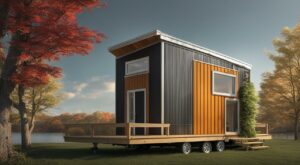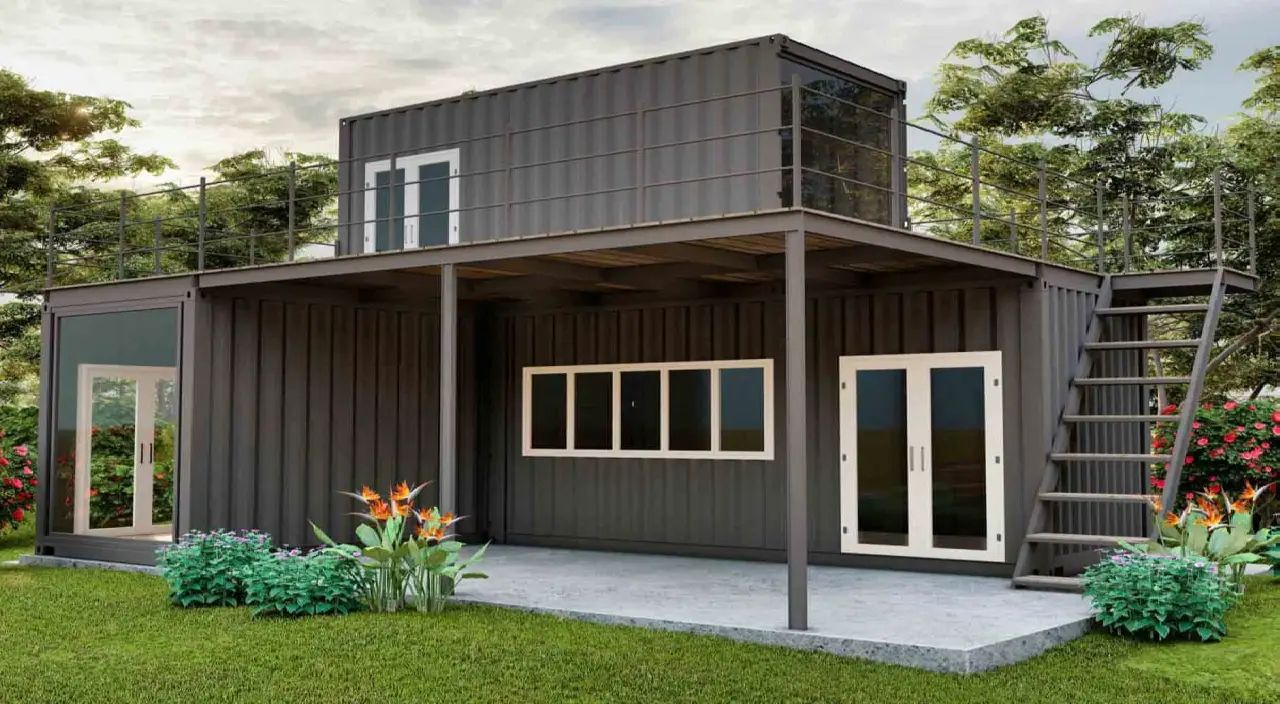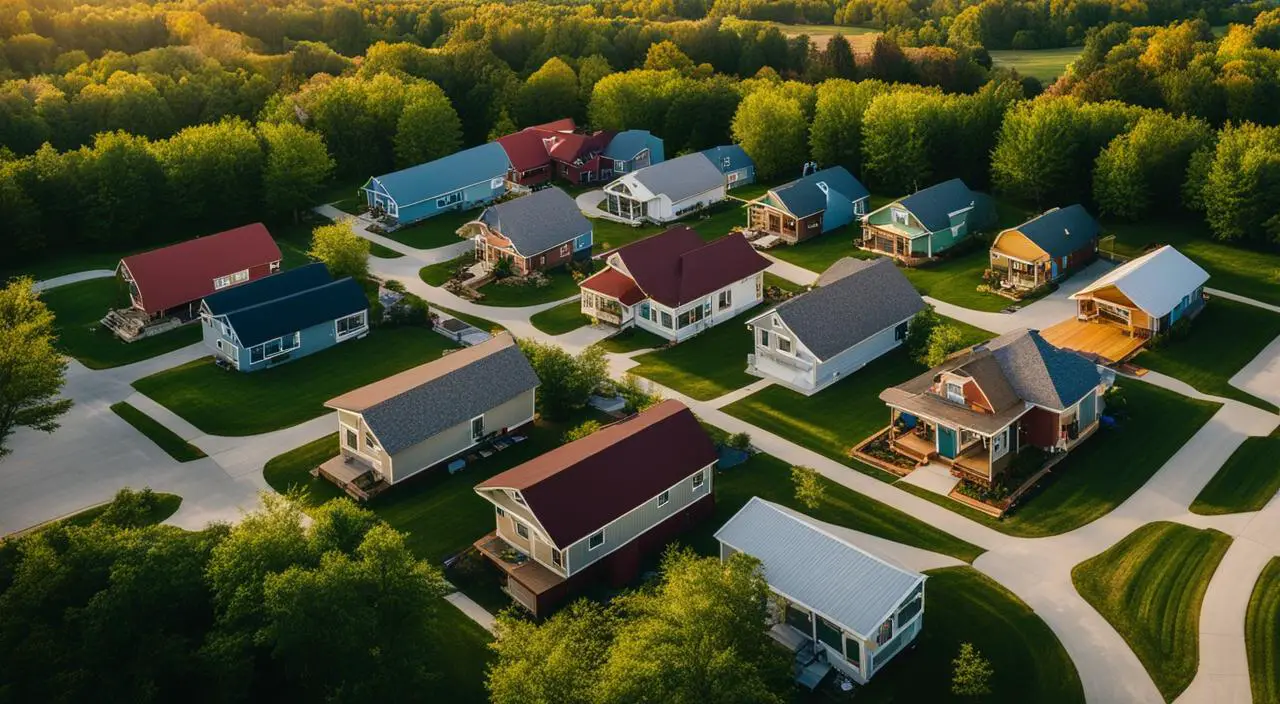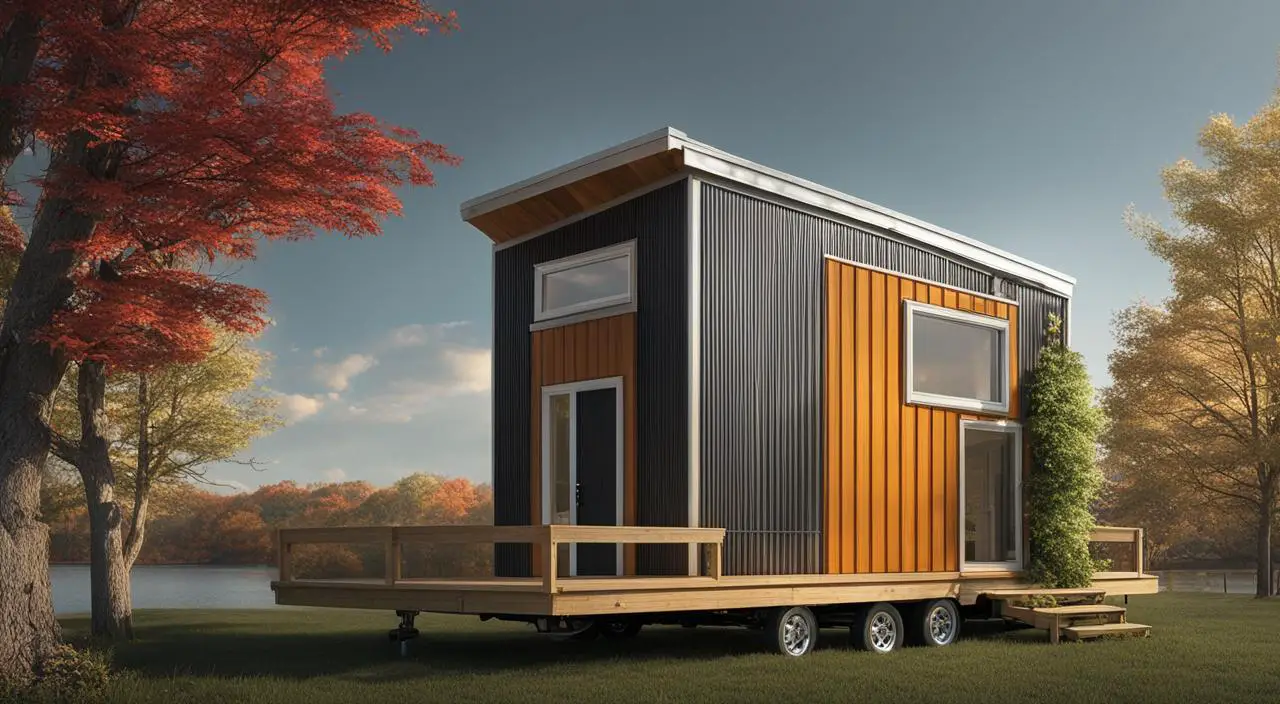Your cart is currently empty!
Tiny House Laws in Spain: A Comprehensive Guide
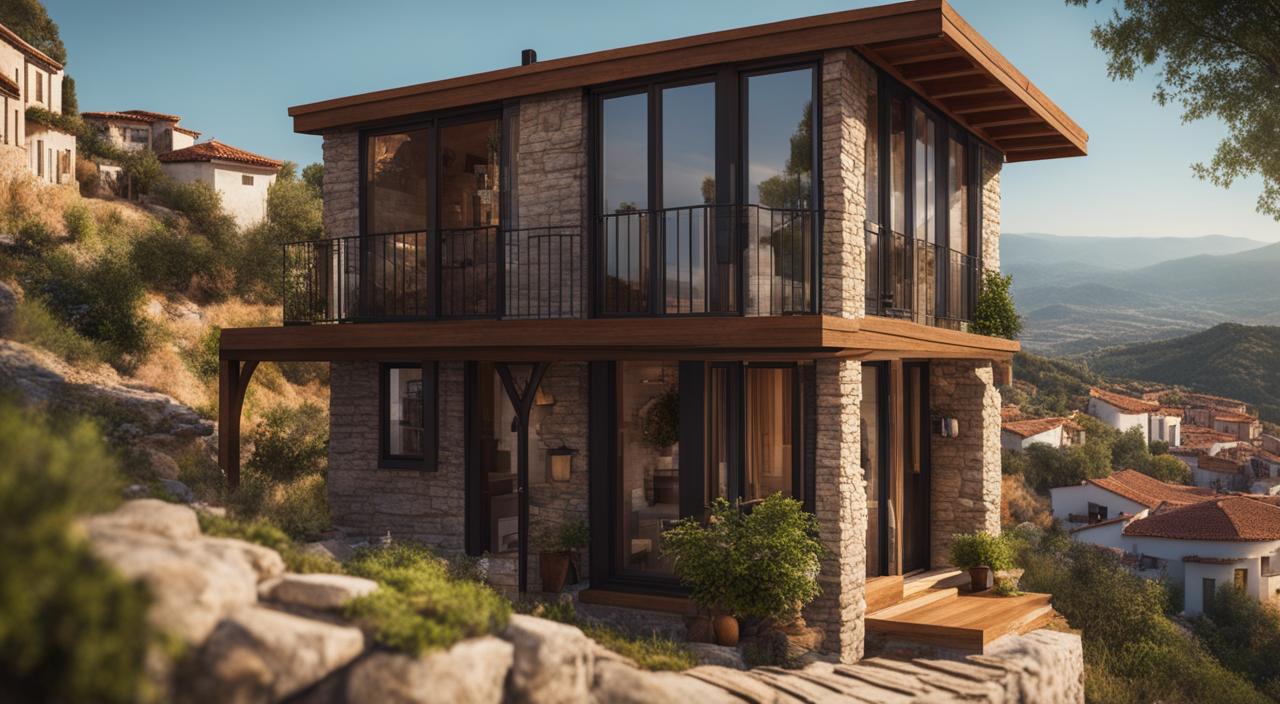
Affiliate Disclaimer: This post may contain affiliate link or links
Tiny House Laws in Spain: Living in a tiny house has become a popular trend in recent times, and Spain is no exception. However, navigating the legalities surrounding tiny house living in Spain can be challenging.
It is important to have a clear understanding of the legal framework, regulations, and requirements surrounding tiny houses in the country.
Contents
This comprehensive guide explores various aspects related to tiny house laws in Spain, including legal recognition, zoning laws, building codes, and property restrictions.
Reversible Houses and Ecological Homes: A Sustainable Living Option
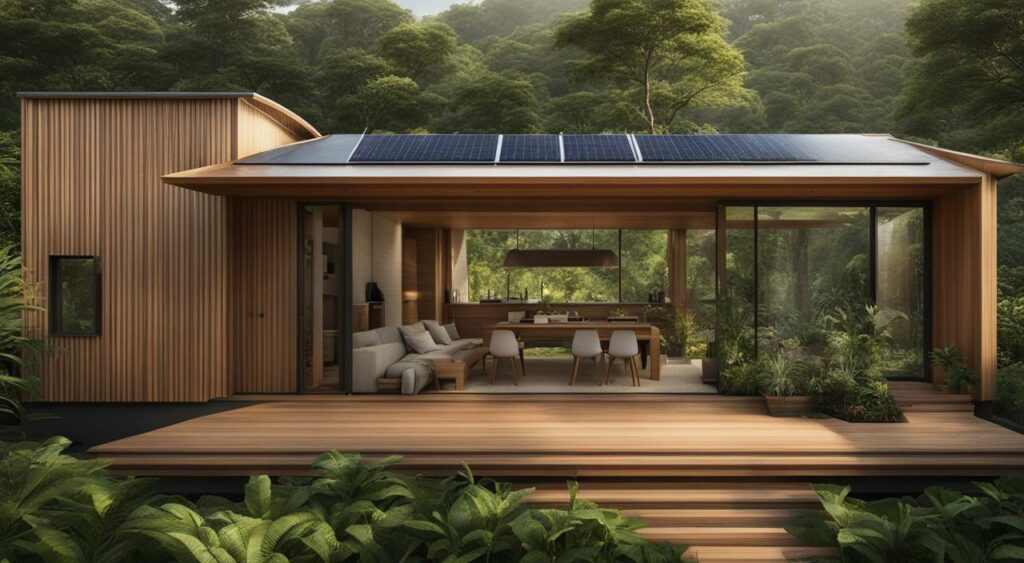
Reversible houses and ecological homes are becoming increasingly popular as a sustainable living option in Spain.
These homes are designed to have little to no negative impact on the environment, making them a great choice for those who want to live a more eco-friendly lifestyle.
One of the key benefits of reversible houses and ecological homes is their minimal impact on the environment.
They are built using sustainable materials and designed to be energy-efficient, reducing their carbon footprint.
These homes also take into account the natural surroundings, often blending into the landscape and using natural materials such as wood and stone.
In Spain, there are eco-friendly housing laws and sustainable architecture standards in place to promote the construction of green buildings and reduce the environmental impact of construction.
These laws aim to ensure that new buildings are energy efficient and sustainable, reducing their impact on the environment.
They also encourage the use of green building practices, such as the use of renewable energy sources and the incorporation of green spaces into building design.
| Eco-Friendly Housing FeaturesBenefits | |
|---|---|
| Use of sustainable materials | Reduces carbon footprint |
| Energy-efficient design | Reduces energy consumption and costs |
| Use of renewable energy sources | Further reduces carbon footprint and energy costs |
| Incorporation of green spaces into building design | Improves air quality and provides natural habitats for wildlife |
It’s important to note that there are also low-impact housing regulations in place in Spain.
These regulations aim to reduce the negative impact of residential construction on the environment by limiting the use of natural resources and promoting the use of sustainable materials.
They also encourage the use of energy-efficient building practices and the incorporation of green spaces into building design.
Overall, reversible houses and ecological homes are a great option for those looking to live a more sustainable lifestyle in Spain.
With eco-friendly housing laws, sustainable architecture standards, and green building practices in place, it’s easier than ever to build a home that has a minimal impact on the environment.
Mobile and Autonomous Homes: Freedom and Flexibility
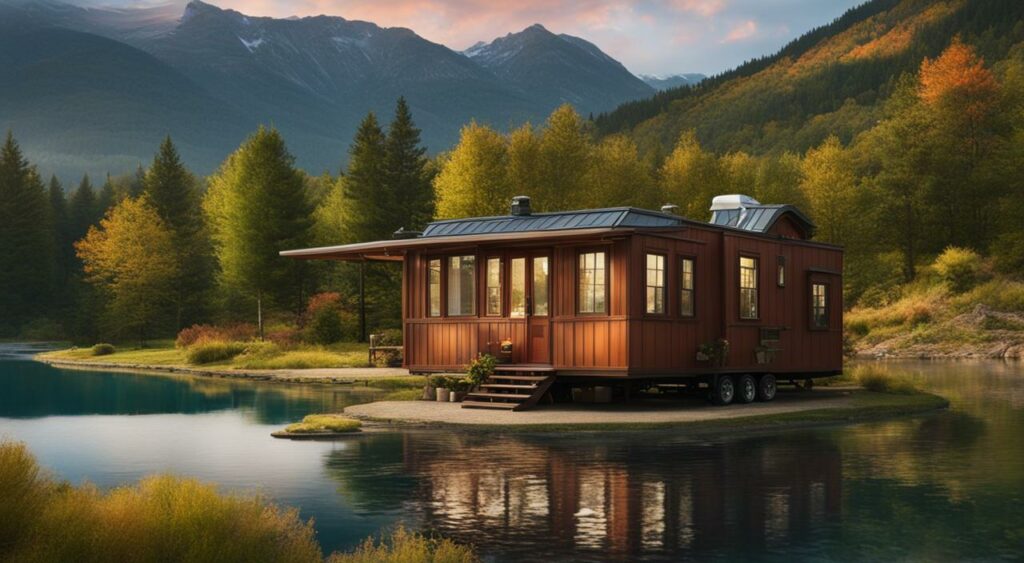
Mobile homes and autonomous homes offer a unique living experience that provides freedom and flexibility to those seeking a simpler lifestyle in Spain.
These alternative housing options have become increasingly popular in recent years, and Spain has recognized the need to regulate this type of living arrangement.
The Spanish government has developed alternative housing policies and urban development guidelines to support the construction and placement of mobile and autonomous homes.
Residential construction codes and compact home permits regulate the design and building of these homes to ensure they meet safety standards and are constructed appropriately.
However, it’s essential to note that land use regulations differ from region to region and must be carefully considered before building a mobile or autonomous home.
Mobile homes also known as trailers or mobile caravans, are transportable dwellings designed to be towed behind a vehicle.
These types of homes are ideal for those who enjoy traveling and desire a more nomadic lifestyle.
Autonomous homes, on the other hand, are self-sufficient dwellings that don’t require any external connections to function. They are often built on wheels and can be moved from place to place with ease.
Alternative housing policies in Spain have been developed to promote sustainable and eco-friendly living arrangements.
These policies encourage the use of renewable energy sources and green building practices to reduce the environmental impact of mobile and autonomous homes.
Urban development guidelines also play a critical role in the placement of mobile and autonomous homes in Spain.
These guidelines help maintain the overall aesthetic of a neighborhood while ensuring that the homes are placed in appropriate locations that adhere to zoning ordinances and building code requirements.
| Residential Construction Codes | Compact Home Permits | Land Use Regulations |
|---|---|---|
| Residential construction codes regulate the design and building of mobile and autonomous homes to ensure they meet safety standards and are constructed appropriately. | Compact home permits are required for building and living in a mobile or autonomous home in Spain. These permits help ensure that the home is constructed according to safety standards and is connected to the necessary utilities. | Land use regulations differ from region to region and must be carefully considered before building a mobile or autonomous home in Spain. |
It’s important to keep in mind that legal constraints on small homes may also apply to mobile and autonomous homes.
These legal constraints may include property size restrictions, zoning codes, and housing code compliance.
However, when built and placed appropriately, mobile and autonomous homes can offer a sustainable, affordable, and flexible living option in Spain.
Legal Aspects and Property Restrictions for Small Homes
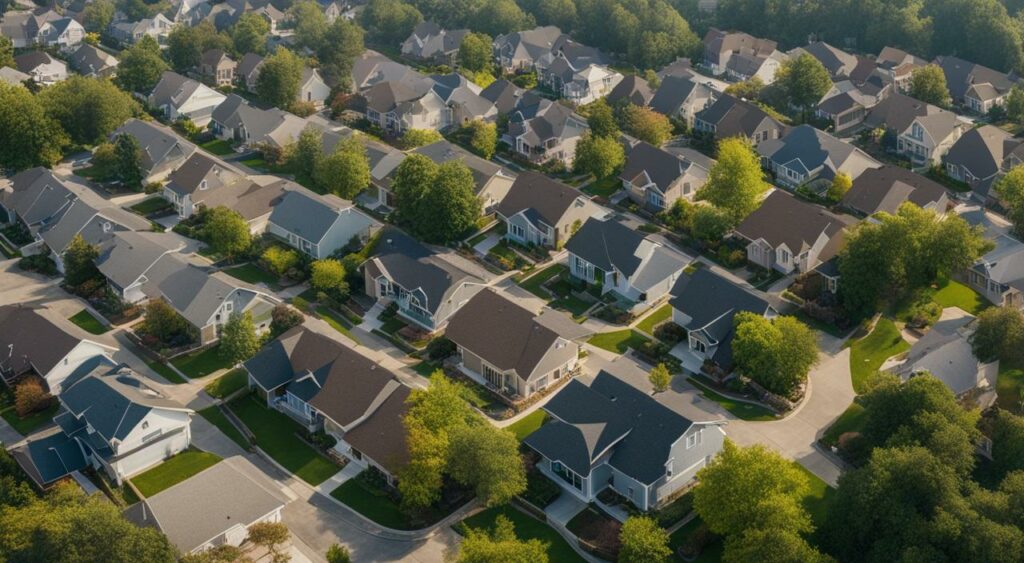
Building and living in a small home in Spain requires an understanding of the legal considerations and property restrictions associated with this type of dwelling.
Residential planning laws and property size restrictions apply to all homes, including small homes, and it’s essential to comply with these regulations to avoid legal complications.
Small footprint housing laws and compact living regulations apply to tiny houses and compact dwellings, defining the minimum size and facilities required for a home.
Property size limits imposed by housing code compliance also play a vital role, as they specify the maximum allowable size for a dwelling based on the lot size and other criteria.
Compliance with housing code regulations is mandatory for constructing a legal small home in Spain. This includes meeting the building size restrictions and obtaining any necessary permits for construction.
Micro-dwelling permits are required for any structure under a certain size limit, and compact home construction permits may also be necessary, depending on the location and other details of the project.
Property owners must understand the legal constraints on small homes and ensure that their properties comply with the relevant regulations.
Failure to comply with the legal requirements for small homes can result in fines, legal action, or forced removal of the structure.
Table: Property Size Restrictions for Small Homes in Spain
| Property Size | Maximum Dwelling Size Allowed |
|---|---|
| Less than 50 square meters | 25 square meters |
| 50 to 100 square meters | 50% of the property size |
| More than 100 square meters | 75 square meters |
The table above shows the maximum dwelling size allowed for small homes in Spain based on the property size.
Property owners must ensure that their dwellings meet these size restrictions and obtain any necessary permits or approvals before construction begins.
Understanding the legal aspects and property restrictions of small homes in Spain is essential for those interested in building and living in a tiny house.
Compliance with the relevant regulations and obtaining the necessary permits can ensure a smooth and legal construction process.
Zoning Ordinances and Building Code Requirements
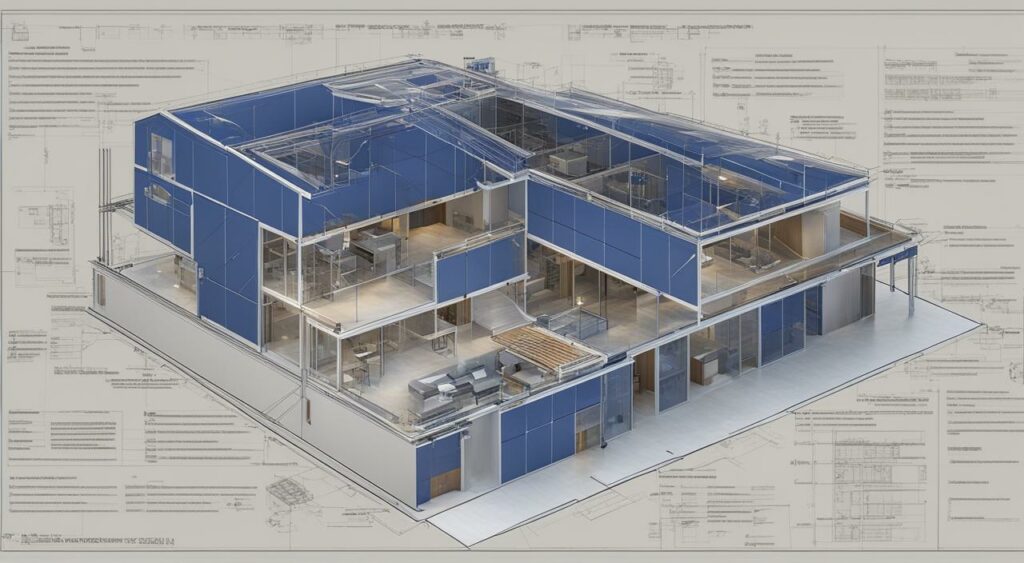
When it comes to building or living in a tiny house in Spain, there are specific zoning ordinances and building code requirements that must be adhered to.
Understanding these regulations is critical to avoid legal issues and penalties.
Planning permission for tiny homes is required before any construction can take place. Local building codes must be followed to ensure that the structure is safe and meets the requirements.
These codes may differ depending on the location of the tiny house, so it’s essential to check with the local authorities before starting construction.
Building size restrictions are also in place to ensure that tiny houses do not take up too much space.
Land development regulations are put in place to control the development and use of land, ensuring that it is used in a way that is consistent with the best interests of the community.
It’s essential to note that each municipality in Spain has its own set of regulations, so it’s crucial to check with the local authorities in the area the tiny house will be built before starting construction.
Failure to comply with these regulations can result in penalties or even the demolition of the tiny house.
“Following local building codes is essential to ensure that the structure is safe and meets the requirements.”
Sustainable Development and Affordable Housing Initiatives
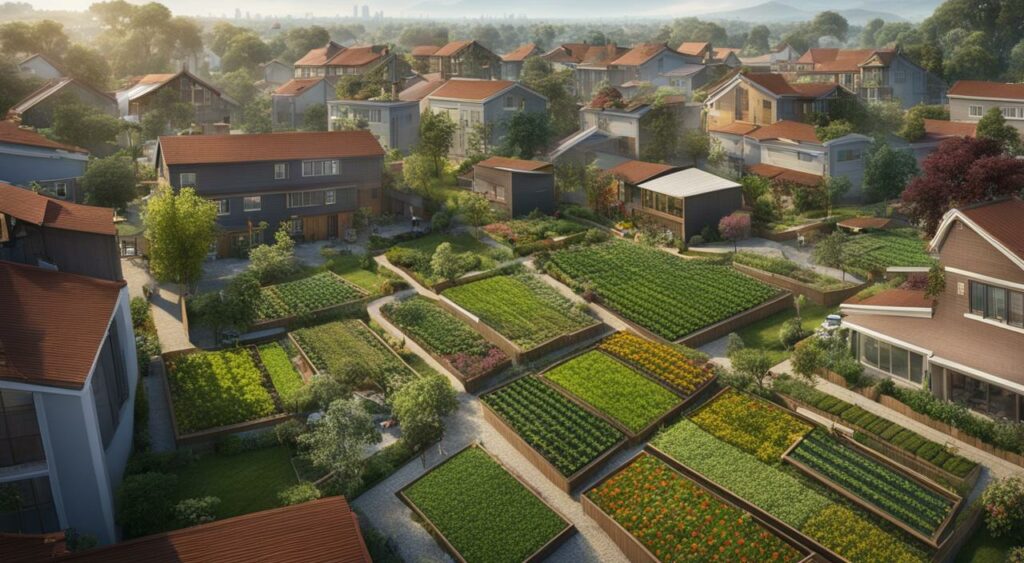
Spain has implemented several sustainable development and affordable housing initiatives to support eco-conscious and affordable living options.
The government has recognized the need for affordable housing regulations and housing affordability measures to address the housing crisis and promote sustainable development policies.
The green space requirements in Spain ensure that the environment is preserved and protected. The eco-conscious housing laws encourage the use of sustainable building materials and renewable energy sources.
These initiatives promote the development of energy-efficient and healthy homes that minimize the environmental impact of housing.
One such initiative is the “Plan Estatal de Vivienda,” a state plan that provides grants and subsidies for home renovation and energy efficiency upgrades.
The program prioritizes affordable housing for low-income families, people with disabilities, and seniors.
The “Plan de Vivienda Joven,” a plan for young people, provides financing options and rental subsidies to help with the purchase or rental of a home.
The program also includes sustainable living initiatives, such as building energy-efficient homes and promoting public transportation and green spaces.
| Affordable Housing RegulationsSustainable Development Policies | |
|---|---|
| Spain has established affordable housing regulations to ensure that housing remains affordable for everyone, regardless of their income level. | Spain’s sustainable development policies encourage the use of sustainable building materials and renewable energy sources in construction projects to minimize environmental impact. |
| These regulations set rent control limits and maximum mortgage rates to prevent speculative housing price increases, making housing more affordable for everyone. | These policies also aim to promote social inclusion and a higher quality of life by developing sustainable public transportation systems and green spaces. |
| They also encourage developers to construct affordable housing units in areas with high demand and limited supply. | These sustainable policies aim to minimize the overall carbon footprint of cities and towns in Spain and promote energy-efficient practices across all industries. |
Overall, Spain’s sustainable development and affordable housing initiatives aim to provide affordable and eco-conscious housing solutions for all citizens.
By promoting energy-efficient, healthy, and sustainable homes, Spain is creating a more livable, equitable, and sustainable future for everyone.
Legal Considerations for Tiny Houses: Permits and Design Standards

In Spain, building and living in a tiny house requires compliance with a series of legal requirements and regulations. The following are some of the key legal considerations for tiny houses in Spain:
Micro-Dwelling Permits
Before constructing and living in a tiny house in Spain, it is necessary to obtain a micro-dwelling permit.
The application requirements may vary depending on the local regulations and zoning ordinances applicable to the specific location.
Generally, the permit application must include a building plan, electricity and water supply plan, and sewage disposal plan.
It is important to ensure compliance with all necessary permit requirements to avoid any legal complications.
Compact Home Design Standards
The design of a tiny house in Spain must meet the compact home design standards, which may vary depending on the region.
These standards may cover essential aspects such as the minimum living space, ceiling height, ventilation, insulation, and fire safety, among others.
It is important to consult the local regulations to ensure compliance with the mandatory design standards for tiny houses.
Micro-Homes Zoning Codes
In Spain, different zoning ordinances apply to the construction of tiny houses.
These codes may vary depending on the region and may cover a wide range of issues such as the location of the tiny house, setbacks, access roads, and parking requirements.
It is crucial to be familiar with the applicable micro-homes zoning codes to avoid any legal constraints when building or living in a tiny house in Spain.
Legal Constraints on Small Homes
When building or living in a tiny house in Spain, it is important to understand the legal constraints on small homes that may apply.
These might include minimum property size restrictions, building size limits, and residential planning laws.
It is essential to be aware of the legal restrictions and compliance requirements to avoid any legal complications.
Compact Home Construction Permits
In Spain, compact home construction permits are required for building a tiny house.
These permits may vary depending on the location, size, and design of the tiny house.
The application requirements may include a detailed construction plan, a description of the materials to be used, and a statement of compliance with the local regulations.
It is crucial to ensure compliance with the mandatory permit requirements to avoid any legal issues when constructing a tiny house in Spain.

Conclusion
In conclusion, understanding the legal framework and considerations surrounding tiny house living in Spain is crucial for anyone interested in pursuing this lifestyle.
This comprehensive guide has provided readers with an overview of the current laws and regulations that govern the construction and placement of tiny houses in the country.
From the legal recognition of tiny houses and the existence of Spanish zoning laws, small house legislation, and micro-housing rules to the sustainable development and affordable housing initiatives.
Readers have been presented with a well-rounded understanding of the legal framework and considerations associated with tiny house living in Spain.
It is essential to comply with the legal requirements and regulations surrounding tiny house living in Spain, including obtaining the necessary permits.
Following the compact home design standards, and complying with the land development regulations.
By doing so, individuals can ensure that their tiny house lifestyle is safe, sustainable, and legally recognized.
Overall, embarking on the journey of building and living in a tiny house in Spain can be a rewarding and fulfilling experience for those who are up for the challenge.
With the right knowledge and preparation, individuals can navigate the legal framework and considerations associated with tiny house living and enjoy the freedom, flexibility, and sustainability that come with this lifestyle.
Other related articles
- Tiny House Laws Indiana: Unlocking the Secrets
- Tiny House Laws in Massachusetts: The Ins and Outs
- Tiny House Laws Colorado: A Friendly Guide
- Tiny House Laws in Florida: Everything You Need to Know
- Understanding Tiny House Laws in Virginia: A Quick Guide
- Tiny House Laws Wisconsin: Understanding The Law

Arc. Joseph Benson the CEO of Free tiny homes, Free Tiny Homes is a free, open-source, collaborative resource for anyone interested in building their own tiny home…


